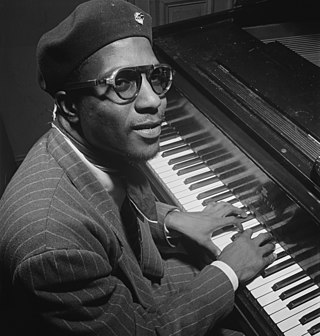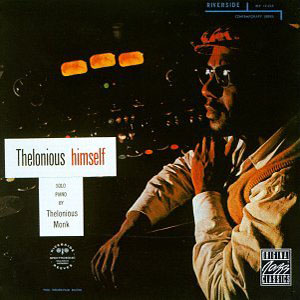
Bebop or bop is a style of jazz developed in the early to mid-1940s in the United States. The style features compositions characterized by a fast tempo, complex chord progressions with rapid chord changes and numerous changes of key, instrumental virtuosity, and improvisation based on a combination of harmonic structure, the use of scales and occasional references to the melody.

Thelonious Sphere Monk was an American jazz pianist and composer. He had a unique improvisational style and made numerous contributions to the standard jazz repertoire, including "'Round Midnight", "Blue Monk", "Straight, No Chaser", "Ruby, My Dear", "In Walked Bud", and "Well, You Needn't". Monk is the second-most-recorded jazz composer after Duke Ellington.

Charles Henry Christian was an American swing and jazz guitarist. He was among the first electric guitarists and was a key figure in the development of bebop and cool jazz. He gained national exposure as a member of the Benny Goodman Sextet and Orchestra from August 1939 to June 1941. His single-string technique, combined with amplification, helped bring the guitar out of the rhythm section and into the forefront as a solo instrument. For this, he is often credited with leading to the development of the lead guitar role in musical ensembles and bands.

Carlos Wesley "Don" Byas was an American jazz tenor saxophonist, associated with swing and bebop. He played with Count Basie, Duke Ellington, Art Blakey, and Dizzy Gillespie, among others, and also led his own band. He lived in Europe for the last 26 years of his life.

Coleman Randolph Hawkins, nicknamed "Hawk" and sometimes "Bean", was an American jazz tenor saxophonist. One of the first prominent jazz musicians on his instrument, as Joachim E. Berendt explained: "there were some tenor players before him, but the instrument was not an acknowledged jazz horn". Hawkins biographer John Chilton described the prevalent styles of tenor saxophone solos prior to Hawkins as "mooing" and "rubbery belches". Hawkins denied being first and noted his contemporaries Happy Caldwell, Stump Evans, and Prince Robinson, although he was the first to tailor his method of improvisation to the saxophone rather than imitate the techniques of the clarinet. Hawkins' virtuosic, arpeggiated approach to improvisation, with his characteristic rich, emotional, and vibrato-laden tonal style, was the main influence on a generation of tenor players that included Chu Berry, Charlie Barnet, Tex Beneke, Ben Webster, Vido Musso, Herschel Evans, Buddy Tate, and Don Byas, and through them the later tenormen, Arnett Cobb, Illinois Jacquet, Flip Phillips, Ike Quebec, Al Sears, Paul Gonsalves, and Lucky Thompson. While Hawkins became known with swing music during the big band era, he had a role in the development of bebop in the 1940s.

Minton's Playhouse is a jazz club and bar located on the first floor of the Cecil Hotel at 210 West 118th Street in Harlem, Manhattan, New York City. It is a registered trademark of Housing and Services, Inc. a New York City nonprofit provider of supportive housing. The door to the actual club itself is at 206 West 118th Street where there is a small plaque. Minton's was founded by tenor saxophonist Henry Minton in 1938. Minton's is known for its role in the development of modern jazz, also known as bebop, where in its jam sessions in the early 1940s, Thelonious Monk, Bud Powell, Kenny Clarke, Charlie Christian, Charlie Parker and Dizzy Gillespie pioneered the new music. Minton's thrived for three decades until its decline near the end of the 1960s, and its eventual closure in 1974. After being closed for more than 30 years, the newly remodeled club reopened on May 19, 2006, under the name Uptown Lounge at Minton's Playhouse, which operated until 2010, before re-opening as Minton's Playhouse in 2013.

Brilliant Corners is a 1957 studio album by American jazz pianist Thelonious Monk. It was his third album for Riverside Records, and his first on the label to include his own compositions.

WKCR-FM is a radio station licensed to New York, New York. The station is owned by Columbia University and serves the New York metropolitan area. Founded in 1941, the station traces its history back to 1908 with the first operations of the Columbia University Radio Club (CURC). In 1956, it became one of the first college radio stations to adopt FM broadcasting, which had been invented two decades earlier by Professor Edwin Howard Armstrong. The station was preceded by student involvement in W2XMN, an experimental FM station founded by Armstrong, for which the CURC provided programming. Originally an education-focused station, since the Columbia University protests of 1968, WKCR-FM has shifted its focus towards alternative musical programming, with an emphasis on jazz, classical, and hip-hop.

Miles & Monk at Newport is a split album featuring separate performances by the Miles Davis sextet and the Thelonious Monk quartet at the Newport Jazz Festival. It was released in June 1964 by Columbia records. Davis's set was recorded in 1958, and Monk's in 1963. Despite the album's title, the two artists do not perform together at either date.

Criss-Cross is an album by Thelonious Monk that was released by Columbia, his second for that label. The album consists of previously released Monk compositions that were re-recorded for Columbia by the Thelonious Monk Quartet.
"Little" Benny Harris was an American bebop trumpeter and composer.

1958 Miles is a compilation album by American jazz musician Miles Davis, released in 1974 on CBS/Sony. Recording sessions for tracks that appear on the album took place on May 26, 1958, at Columbia's 30th Street Studio and September 9, 1958, at the Plaza Hotel in New York City. 1958 Miles consists of three songs featured on side two of the LP album Jazz Track, which was released in November 1959, one song from the same session not appearing in the album, and three recordings from Davis' live performance at the Plaza Hotel with his ensemble sextet. The recording date at 30th Street Studio served as the first documented session to feature pianist Bill Evans performing in Davis' group.

Reflections is the second album by Steve Lacy which was released on the Prestige label in 1959. It features performances of Thelonious Monk's compositions by Lacy, Mal Waldron, Buell Neidlinger and Elvin Jones.

The Complete Blue Note Recordings of Thelonious Monk is a box set by American jazz pianist Thelonious Monk compiling his recordings for Blue Note first released as a limited four-LP box set on Mosaic Records in 1983 before being issued as a four-CD box set by Blue Note for the first time in 1994 as The Complete Blue Note Recordings.

Thelonious Himself is a studio album by Thelonious Monk released in 1957 by Riverside Records. It was Monk's fourth album for the label. The album features Monk playing solo piano, except for the final track, "Monk's Mood", which features John Coltrane on tenor saxophone and Wilbur Ware on bass. It was Monk's second solo piano studio album, and it was the first made by an American label and distributed in the United States.

Reincarnation of a Love Bird is an album by Paul Motian, released on the German JMT label in 1994. It contains performances of bebop jazz standards by Motian with the Electric Bebop Band. The album follows on from the 1992 release Paul Motian and the Electric Bebop Band, and was rereleased on the Winter & Winter label in 2005. The band features Motian with saxophonists Chris Potter and Chris Cheek, guitarists Wolfgang Muthspiel and Kurt Rosenwinkel, bass guitarist Steve Swallow and percussionist Don Alias.

The Real Quiet Storm is the third studio album by saxophonist James Carter, the first to be released on the Atlantic label. It was recorded in October & November 1994 and released on March 10, 1995.

Live in Tokyo is a live album by the American jazz trumpeter-composer Charles Tolliver and his quartet Music Inc. Their fifth album overall, it was recorded on December 7, 1973, at Yubinchokin Hall in Tokyo during Tolliver and Music Inc.'s first tour of Japan. The quartet – featuring the pianist Stanley Cowell, the bassist Clint Houston, and Clifford Barbaro on drums – played the show in mostly fast tempo and performed three of Tolliver's original compositions, along with a ballad composed by Cowell and the Thelonious Monk standard "'Round Midnight".

Onyx Records, Inc., was a small, independent American record label based in Manhattan, New York, co-founded on July 15, 1971, by Joe Fields (1929–2017) and Don Schlitten and managed by Gentry McCreary. Its address was at 160 West 71st Street on the Upper West Side.


















